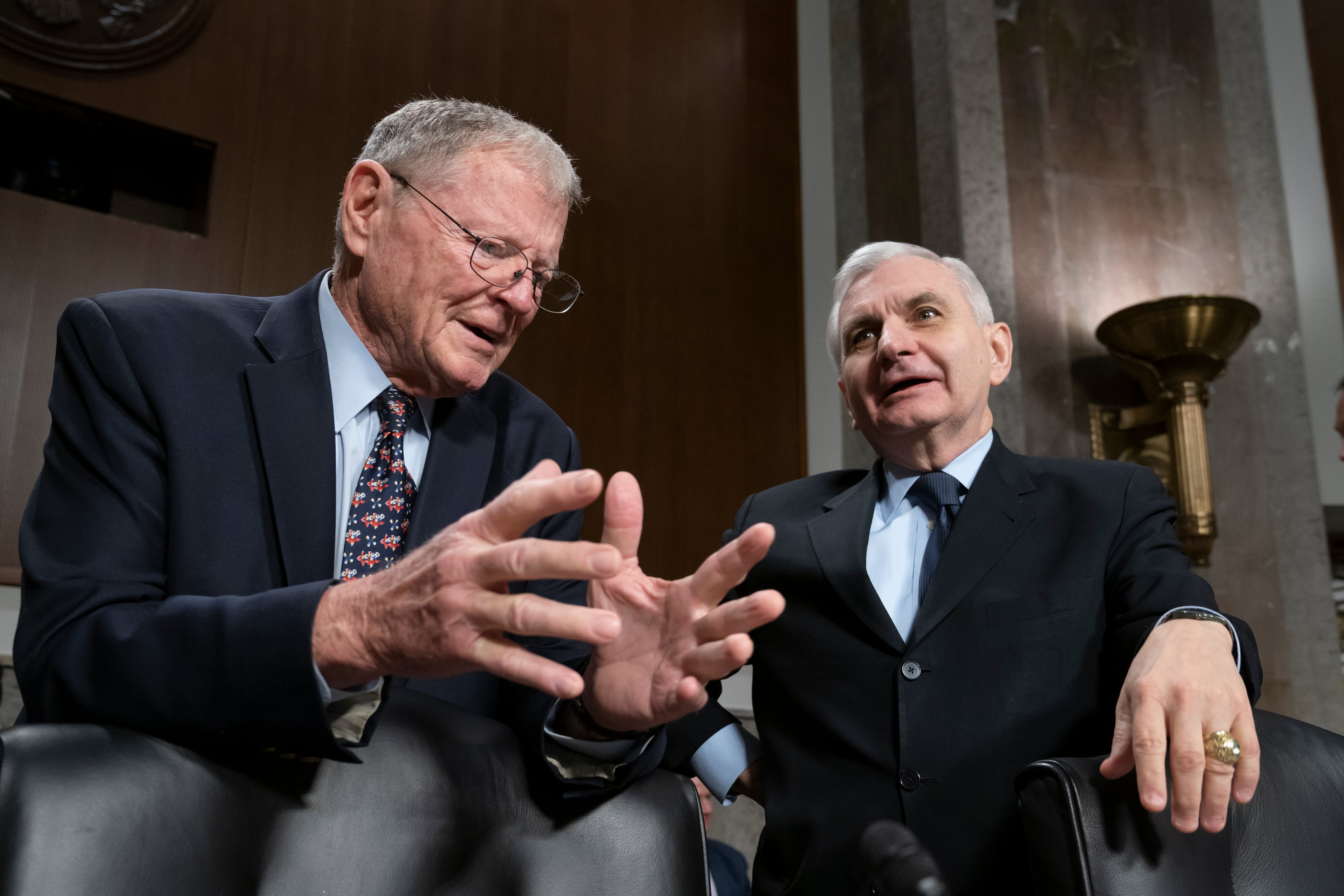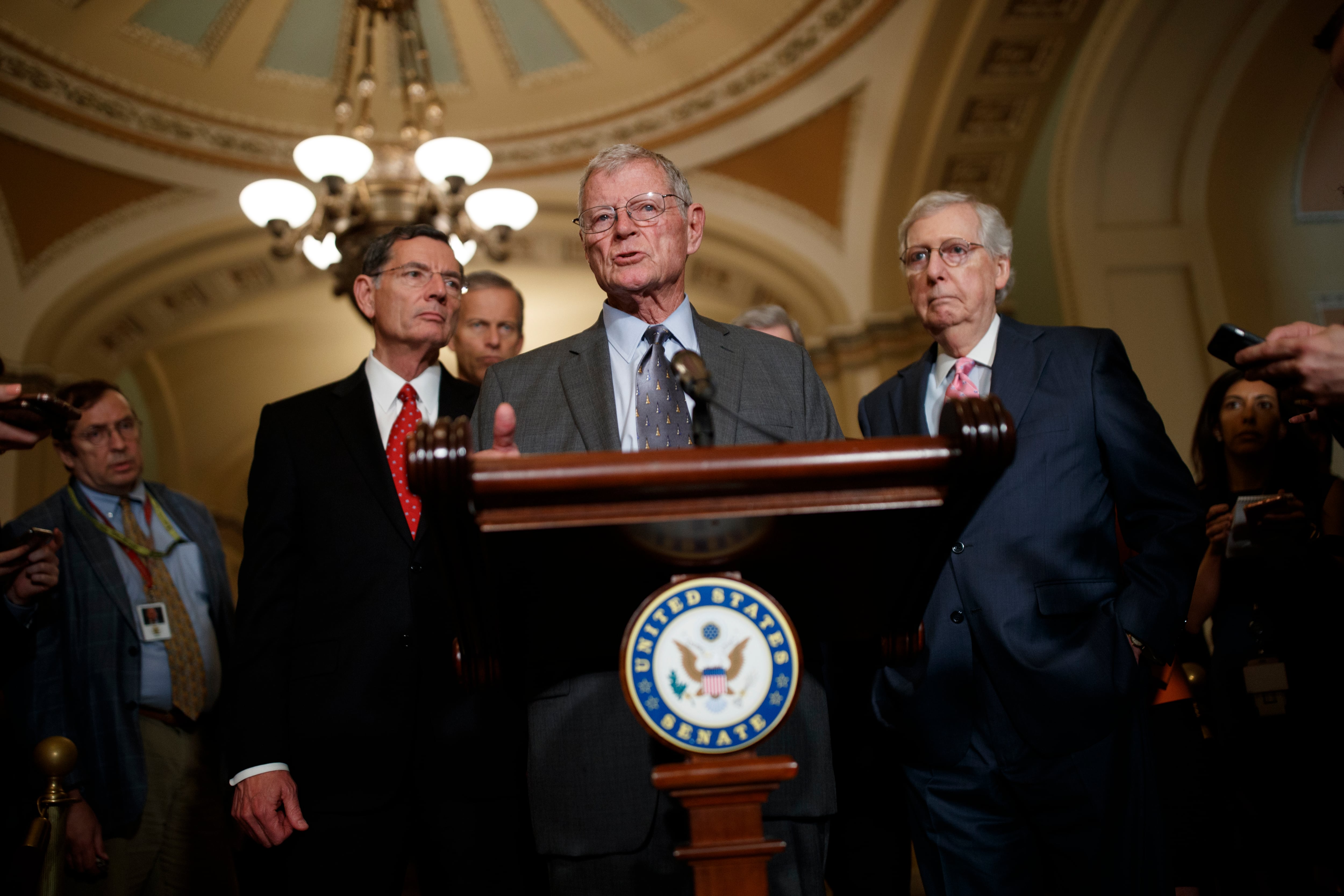WASHINGTON — Senators on Thursday overwhelmingly passed a $750 billion defense authorization bill for next year despite concerns from congressional Democrats over the size spending totals, an expansion of the U.S. nuclear arsenal and a lack of a check on President Donald Trump’s war powers.
The 86-8 vote all but erased a week of uncertainty surrounding the must-pass budget policy measure, which has passed Congress for more than five consecutive decades. That measure has faced a difficult path this year as the White House and Democratic leaders spar over a host of military issues.
Among the Democratic presidential candidates, Sens. Corey Booker and Amy Klobuchar voted “nay,” while Sens. Michael Bennet, Kirsten Gillibrand, Kamala Harris, Bernie Sanders and Elizabeth Warren did not vote — likely due to the primary debates in Florida this week. Republicans Mike Braun, Rand Paul and Mike Lee also voted “nay” alongside Democrats Ed Markey, Jeff Merkley and Ron Wyden.
Senate Armed Services Committee Chairman Jim Inhofe, R-Okla., framed the bill as a continuation of the Trump administration’s efforts to “rebuild” the military and to counter threats from around the globe.
“The world is more unstable and dangerous than any time in my lifetime,” Inhofe said when he introduced the bill. “The National Defense Strategy gave it to us straight: strategic competition with China and Russia; continuing threats from rogue countries like Iran and North Korea, and terrorist organizations; new technology and new war-fighting domains in outer space and cyberspace; not to mention, years of underfunding under the previous administration.”
“This is a very good bill,” the committee’s top Democrat, Sen. Jack Reed of Rhode Island, said in the run up to the vote. “It passed our committee on a vote of 25-2, a totally bipartisan vote. It contains many needed authorities, funding authorizations, and reforms that will help the men and women of our armed services.”
RELATED

The House is expected to vote on its version of the measure next month, after floor debates on issues of transgender enlistment, nuclear weapons limits, climate change’s impact on national security and money for President Donald Trump’s controversial southern border wall.
The Senate version adopted Thursday bypasses most of those issues, but does contain authorization for about $17 billion more in defense spending next year than House Democrats have backed in their appropriations measures. The two chambers are expected to reconcile their bills in conference during the weeks and months ahead.
In an unusual move designed to advance the massive defense bill before the July 4 congressional recess, senators approved the legislation on Thursday pending the outcome of a day-long vote on U.S. military involvement in Iran on Friday.
The amendment, which needs 60 votes to pass, would prohibit funding of U.S. military action against Iran without the approval of Congress.
Senate Majority Leader Mitch McConnell, R-Ky., and other Senate leaders opposed the measure but allowed the vote to accommodate Democrats in Florida for the party’s primary debates. It is expected to fail, given a lack of support among the majority Republicans.
RELATED

Spending fight
House Democrats have set a defense budget target of $733 billion next year, and already adopted that level as part of a broader government appropriations plan.
House Armed Services Committee Chairman Adam Smith, D-Wash., has argued that level is an appropriate increase in funding from fiscal 2019 (up about 2.4 percent) that meets military readiness and modernization needs without the potential for waste and abuse.
But Inhofe has called the $750 billion figure the “bare minimum” needed for the military to respond to evolving security threats. The White House and House Republican lawmakers have backed that level too.
By passing the Senate authorization bill with bipartisan backing, supporters are hoping they’ll have extra momentum for that higher spending level as they head into inter-chamber negotiations. Those will begin after the House passage of the authorization bill and are expected to last into the fall.
If the two sides can’t reach a deal on defense (and non-defense) spending levels by Oct. 1, they risk triggering another partial government shutdown.
Other provisions
The measure contains a 3.1 percent pay raise for troops starting next January, in line with plans from House Democrats and the White House. If approved, it will be the largest yearly pay boost troops have seen in a decade.
It also goes along with White House plans to add about 6,200 service members to the active-duty force next year. Of that, about 2,500 would be added to the Navy, 2,000 for the Army, 1,700 for the Air Force and 100 for the Marine Corps.
Senators included about $300 million in new spending authorities for improvements to military housing, in response to reports of substandard living conditions at bases around the country. The House defense plan includes similar provisions but only half the money. The White House’s draft includes no such plans.
On the nuclear arsenal, the Senate plan would fully fund Pentagon modernization programs, including the triad of delivery systems. That is sure to be a sticking point when the measure reaches negotiations with House Democrats, who have proposed sharp cuts in that area.
It authorizes $10 billion for 94 fifth-generation Joint Strike Fighter aircraft, adding 16 to the administration’s request, while buying eight fourth-generation F-15X aircraft for $948 million, shorting the administration’s F-15X request by $162 million. It also authorizes $2.8 billion for 15 KC-46A aircraft, or three more.
Twelve new ships are included for $24.1 billion. Submarine spending includes $4.7 billion for Virginia payload modules in two Virginia-class subs and advanced funding for an additional Virginia-class submarine.
For the Army, it surpasses the administration’s request with 48 AH-64E Apaches and 33 UH-60V Black Hawk conversions, but seven fewer UH-60M Black Hawks. The service would buy 65 Armored Multi-Purpose Vehicles, 53 Paladin Integrated Management sets, and spend $393.6 million on the Stryker, adding to the administration’s request for the 30mm cannon upgrade.
Leo covers Congress, Veterans Affairs and the White House for Military Times. He has covered Washington, D.C. since 2004, focusing on military personnel and veterans policies. His work has earned numerous honors, including a 2009 Polk award, a 2010 National Headliner Award, the IAVA Leadership in Journalism award and the VFW News Media award.
Joe Gould was the senior Pentagon reporter for Defense News, covering the intersection of national security policy, politics and the defense industry. He had previously served as Congress reporter.




